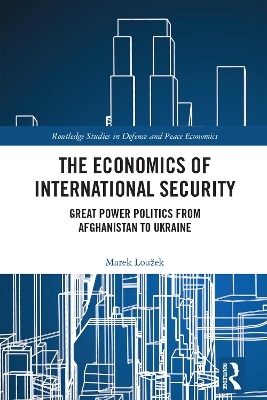
The Economics of International Security
Great Power Politics from Afghanistan to Ukraine
Seiten
2024
Routledge (Verlag)
978-1-032-73274-9 (ISBN)
Routledge (Verlag)
978-1-032-73274-9 (ISBN)
This book explores international security relations as the pandemic subsides and the war in Ukraine escalates, offering a good description of the main actors and the background of current threats. It lays the theoretical foundations for security economics, points out the pitfalls of exporting democracy and presents the paradox of progress.
International relations since the end of the Cold War have been relatively uneasy, yet we should not discount the fact that the intensity of conflicts has decreased compared to the situation in both the first and second halves of the 20th century. This book explores international security relations as the pandemic subsides and the war in Ukraine escalates, offering a good description of the main actors and the background of current threats.
It lays the theoretical foundations for security economics, analyses U.S. foreign policy, introduces China as a new superpower and signals Russia as a great power in decline. It concludes by pointing out the pitfalls of exporting democracy and presenting the paradox of progress. The author asserts that we should not be alarmed that international relations are shifting. Following the Cold War, the U.S. achieved clear strategic and economic superiority, however, China, Russia, India and other great powers remain strong players that must be taken seriously.
The book shows that asymmetric warfare often ends with the weaker side winning and the stronger one losing and being discredited. Different examples of this outcome include the American War in Vietnam (1965-73), the Soviet Union's defeat in Afghanistan (1979-1990), and the U.S. getting mired in the wars of Afghanistan and Iraq. The war in Ukraine is a demonstration of the illusion of an imperial power that believes it can impose its will on other nations, even against their will.
The book will be a useful resource for academics, students and researchers, as well as policymakers and professionals interested in issues related to international security and defense.
International relations since the end of the Cold War have been relatively uneasy, yet we should not discount the fact that the intensity of conflicts has decreased compared to the situation in both the first and second halves of the 20th century. This book explores international security relations as the pandemic subsides and the war in Ukraine escalates, offering a good description of the main actors and the background of current threats.
It lays the theoretical foundations for security economics, analyses U.S. foreign policy, introduces China as a new superpower and signals Russia as a great power in decline. It concludes by pointing out the pitfalls of exporting democracy and presenting the paradox of progress. The author asserts that we should not be alarmed that international relations are shifting. Following the Cold War, the U.S. achieved clear strategic and economic superiority, however, China, Russia, India and other great powers remain strong players that must be taken seriously.
The book shows that asymmetric warfare often ends with the weaker side winning and the stronger one losing and being discredited. Different examples of this outcome include the American War in Vietnam (1965-73), the Soviet Union's defeat in Afghanistan (1979-1990), and the U.S. getting mired in the wars of Afghanistan and Iraq. The war in Ukraine is a demonstration of the illusion of an imperial power that believes it can impose its will on other nations, even against their will.
The book will be a useful resource for academics, students and researchers, as well as policymakers and professionals interested in issues related to international security and defense.
Marek Loužek is an associate professor of economics at Prague University of Economics and Business (Faculty of Economics) and Czech Technical University in Prague (Faculty of Biomedical Engineering).
1. Theoretical Foundations of Security Economics 2. The United States as a Superpower 3. China as a New Superpower 4. Russia as a Declining Great Power 5. The Challenges of Exporting Democracy 6. Paradox of Progress
| Erscheinungsdatum | 21.04.2024 |
|---|---|
| Reihe/Serie | Routledge Studies in Defence and Peace Economics |
| Zusatzinfo | 7 Tables, black and white; 14 Line drawings, black and white; 14 Illustrations, black and white |
| Verlagsort | London |
| Sprache | englisch |
| Maße | 156 x 234 mm |
| Gewicht | 449 g |
| Themenwelt | Naturwissenschaften ► Geowissenschaften ► Geografie / Kartografie |
| Sozialwissenschaften ► Politik / Verwaltung ► Europäische / Internationale Politik | |
| Wirtschaft ► Allgemeines / Lexika | |
| Wirtschaft ► Volkswirtschaftslehre ► Makroökonomie | |
| Wirtschaft ► Volkswirtschaftslehre ► Mikroökonomie | |
| Wirtschaft ► Volkswirtschaftslehre ► Wirtschaftspolitik | |
| ISBN-10 | 1-032-73274-1 / 1032732741 |
| ISBN-13 | 978-1-032-73274-9 / 9781032732749 |
| Zustand | Neuware |
| Informationen gemäß Produktsicherheitsverordnung (GPSR) | |
| Haben Sie eine Frage zum Produkt? |
Mehr entdecken
aus dem Bereich
aus dem Bereich
Eine Einführung in die spezielle Mineralogie, Petrologie und …
Buch | Hardcover (2022)
Springer Spektrum (Verlag)
CHF 83,95
über eine faszinierende Welt zwischen Wasser und Land und warum sie …
Buch | Hardcover (2023)
dtv (Verlag)
CHF 33,55
Buch | Hardcover (2024)
Schweizerbart'sche, E. (Verlag)
CHF 33,55


